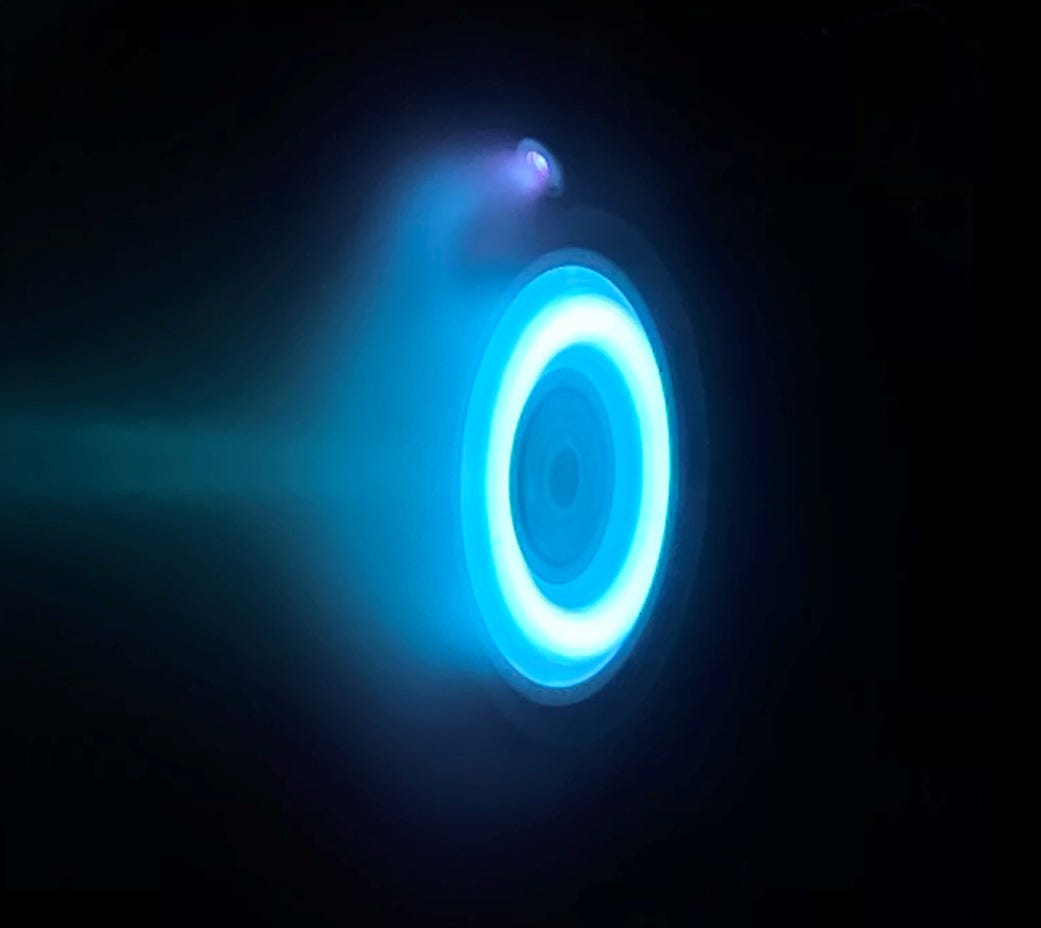DTN 062: Light-based Chips for AI Compute
Plus: NASA wants lunar maglev, DoD thinks Russia launched a space weapon, microplastics in testicles, RIP doge, swarming alien solar systems with picospacecraft, and more.
“Right now small spacecrafts are being shipped by FedEx or UPS, and very large spacecrafts are being shipped in fancy containers but there is no good solution for anything in the middle. In a world where spacecraft, laden with propellant, are going out to space twice a day, things need to become more systematized. That is where we come in.”
The Big Picture
How to Build 300k Airplanes in Five Years
“It’s no secret that the Allies won World War II on the back of the U.S.’s enormous industrial output. One of the most important elements in the “Arsenal of Democracy” was aircraft. Over the course of the war the U.S. produced around 325,000 airplanes valued at roughly $46 billion ($800 billion in 2024 dollars). Not only is this more aircraft than what Germany, Japan, and Italy combined produced during the war — it’s also more aircraft than have been built for commercial transport in the entire history of aviation.World War II aircraft production shows that it's possible for a complex manufacturing industry to grow incredibly rapidly. But it also shows the limits of that scale up; that even in an emergency some things can only be accelerated so much, and success depends on what preparations have been taken beforehand." (Construction Physics)
Deep Tech News
Pentagon: Russia likely launched counter space weapon into low Earth orbit last week
AI is a black box. Anthropic figured out a way to look inside
As UK launches semiconductor institute, EU chips get €2.5B boost
Single brain implant restores bilingual communication to paralyzed man
AI needs enormous computing power. Could light-based chips help?
Blue Origin flies thrill seekers to space after two year hiatus
Finnish startup gets full funding for world-first fungal protein factory
The US’s first hydrogen-fueled ship is officially ready to set sail
VCs and the military are fueling self-driving startups that don’t need roads
IndieBio’s SF incubator lineup is making some wild biotech promises
JPEG of the Week
This is an operating electric Hall thruster identical to those being used to propel NASA’s Psyche spacecraft on the way to its namesake asteroid. The blue glow comes from the charged atoms, or ions, of xenon.
NASA’s Psyche spacecraft passed its six-month checkup with a clean bill of health, and navigators fired up its electric Hall thrusters, which emit a blue glow, as the orbiter zips farther into deep space. They are part of Psyche’s incredibly efficient solar electric propulsion system, which is powered by sunlight. The thrust created by the ionized xenon is gentle, but it does the job. Even in full cruise mode, the pressure exerted by the thrusters is about what you’d feel holding three quarters in your hand. (via NASA)
Peer Review
Building artificial cells to measure energy flow in living systems
New crystal production method could enhance quantum computers and electronics
New catalyst transforms carbon dioxide from industrial emissions into commonly used chemicals
Study reveals promising development in cancer-fighting nanotechnologies
Using DNA origami, researchers create diamond lattice for future semiconductors of visible light
Researchers develop world's smallest quantum light detector on a silicon chip
Researchers develop perovskite X-ray detector for medical imaging
Funding x M&A
Space VC closes $20M Fund II to back frontier tech founders from day zero
Autonomous shipping startup Orca AI tops up with $23M led by OCV Partners and MizMaa Ventures
Bedrock Materials secures $9M seed funding, establishes R&D headquarters in Chicago
Swiss startup creates modular device for on-demand cell therapy manufacturing
Ex-Deepmind scientists raise $220m seed round to launch Paris-based “agentic” AI startup H
Bill Gates-backed wind startup AirLoom is raising $12M, filings reveal
Caeli Wind, a platform for analyzing and marketing wind energy locations, raised a $11M round
Overland AI, an autonomous ground vehicle tech for the defense sector, raised a $10M seed round
Subeca, a startup providing low cost and easy-to-use water technology, raised a $6M Series A
AI data foundry Scale AI raised a $1B series F at a $13.8B valuation
Harbinger, an electric truck manufacturer, raised a $13M round
Aeromine Technologies, a startup developing rooftop wind energy solutions, raised a $9M Series A
Miscellanea
Trying out the Panel-of-Experts prompting strategy for LLMs / University suspends students for AI homework tool it gave them $10,000 prize to make / She sold her bathwater — PayPal took her profits / Scarlett Johansson says that OpenAI approached her to use her voice / Edited highlights from the evisceration of Craig Wright / FBI arrests man for generating AI child sexual abuse imagery / Scientists Confirm Microplastics Now Detected in Human Testicles / China uses giant rail fun to shoot a smart bomb nine miles into the sky / NYPD will deploy drones to respond to 911 calls in 5 NYC precincts, officials say / Swarming Proxima Centauri: Picospacecraft Swarms over Interstellar Distances / Daily cannabis use overtakes drinking in US first / Cement recycling method could help solve one of the biggest climate challenges / Wi-Fi devices set to become object sensors by 2024 via new IEEE standard / Kabosu, the Dog Behind the 'Doge' Meme, Has Died / Imperceptible sensors can be printed directly on human skin / Peeking underground with giant flying antennas / Google AI: People should eat at least one small rock a day
The Deep Tech Agency.
HAUS is a strategic communications agency in NYC. We specialize in marketing and public relations for deep tech startups. Check out our website, follow us on Twitter, or say hello@hausb.io






